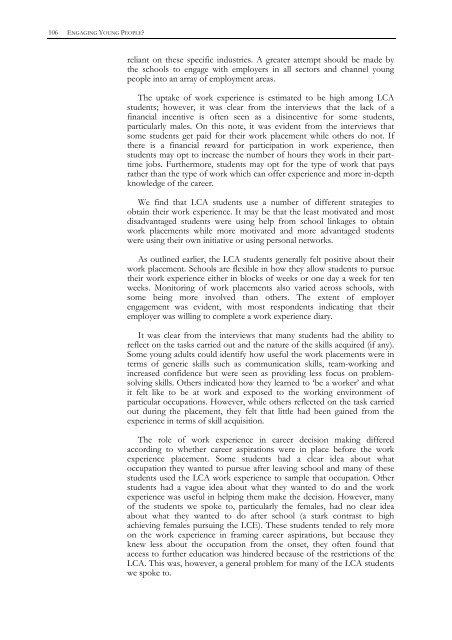Student Experiences of the Leaving Certificate Applied Programme
Student Experiences of the Leaving Certificate Applied Programme
Student Experiences of the Leaving Certificate Applied Programme
You also want an ePaper? Increase the reach of your titles
YUMPU automatically turns print PDFs into web optimized ePapers that Google loves.
106 ENGAGING YOUNG PEOPLE?reliant on <strong>the</strong>se specific industries. A greater attempt should be made by<strong>the</strong> schools to engage with employers in all sectors and channel youngpeople into an array <strong>of</strong> employment areas.The uptake <strong>of</strong> work experience is estimated to be high among LCAstudents; however, it was clear from <strong>the</strong> interviews that <strong>the</strong> lack <strong>of</strong> afinancial incentive is <strong>of</strong>ten seen as a disincentive for some students,particularly males. On this note, it was evident from <strong>the</strong> interviews thatsome students get paid for <strong>the</strong>ir work placement while o<strong>the</strong>rs do not. If<strong>the</strong>re is a financial reward for participation in work experience, <strong>the</strong>nstudents may opt to increase <strong>the</strong> number <strong>of</strong> hours <strong>the</strong>y work in <strong>the</strong>ir parttimejobs. Fur<strong>the</strong>rmore, students may opt for <strong>the</strong> type <strong>of</strong> work that paysra<strong>the</strong>r than <strong>the</strong> type <strong>of</strong> work which can <strong>of</strong>fer experience and more in-depthknowledge <strong>of</strong> <strong>the</strong> career.We find that LCA students use a number <strong>of</strong> different strategies toobtain <strong>the</strong>ir work experience. It may be that <strong>the</strong> least motivated and mostdisadvantaged students were using help from school linkages to obtainwork placements while more motivated and more advantaged studentswere using <strong>the</strong>ir own initiative or using personal networks.As outlined earlier, <strong>the</strong> LCA students generally felt positive about <strong>the</strong>irwork placement. Schools are flexible in how <strong>the</strong>y allow students to pursue<strong>the</strong>ir work experience ei<strong>the</strong>r in blocks <strong>of</strong> weeks or one day a week for tenweeks. Monitoring <strong>of</strong> work placements also varied across schools, withsome being more involved than o<strong>the</strong>rs. The extent <strong>of</strong> employerengagement was evident, with most respondents indicating that <strong>the</strong>iremployer was willing to complete a work experience diary.It was clear from <strong>the</strong> interviews that many students had <strong>the</strong> ability toreflect on <strong>the</strong> tasks carried out and <strong>the</strong> nature <strong>of</strong> <strong>the</strong> skills acquired (if any).Some young adults could identify how useful <strong>the</strong> work placements were interms <strong>of</strong> generic skills such as communication skills, team-working andincreased confidence but were seen as providing less focus on problemsolvingskills. O<strong>the</strong>rs indicated how <strong>the</strong>y learned to ‘be a worker’ and whatit felt like to be at work and exposed to <strong>the</strong> working environment <strong>of</strong>particular occupations. However, while o<strong>the</strong>rs reflected on <strong>the</strong> task carriedout during <strong>the</strong> placement, <strong>the</strong>y felt that little had been gained from <strong>the</strong>experience in terms <strong>of</strong> skill acquisition.The role <strong>of</strong> work experience in career decision making differedaccording to whe<strong>the</strong>r career aspirations were in place before <strong>the</strong> workexperience placement. Some students had a clear idea about whatoccupation <strong>the</strong>y wanted to pursue after leaving school and many <strong>of</strong> <strong>the</strong>sestudents used <strong>the</strong> LCA work experience to sample that occupation. O<strong>the</strong>rstudents had a vague idea about what <strong>the</strong>y wanted to do and <strong>the</strong> workexperience was useful in helping <strong>the</strong>m make <strong>the</strong> decision. However, many<strong>of</strong> <strong>the</strong> students we spoke to, particularly <strong>the</strong> females, had no clear ideaabout what <strong>the</strong>y wanted to do after school (a stark contrast to highachieving females pursuing <strong>the</strong> LCE). These students tended to rely moreon <strong>the</strong> work experience in framing career aspirations, but because <strong>the</strong>yknew less about <strong>the</strong> occupation from <strong>the</strong> onset, <strong>the</strong>y <strong>of</strong>ten found thataccess to fur<strong>the</strong>r education was hindered because <strong>of</strong> <strong>the</strong> restrictions <strong>of</strong> <strong>the</strong>LCA. This was, however, a general problem for many <strong>of</strong> <strong>the</strong> LCA studentswe spoke to.

















